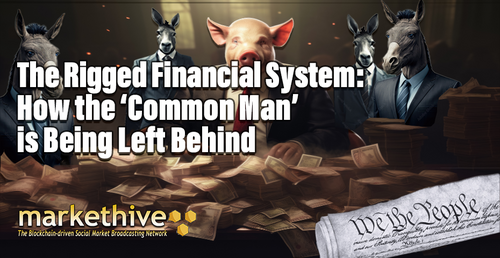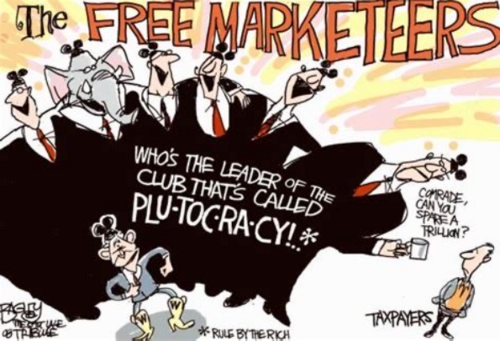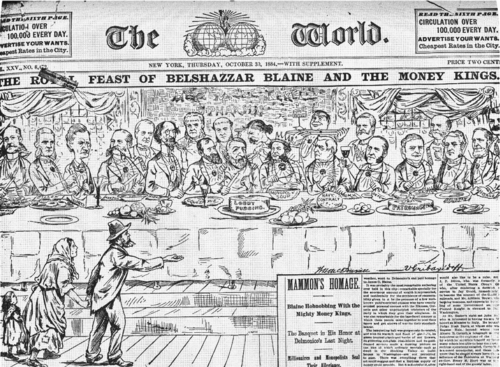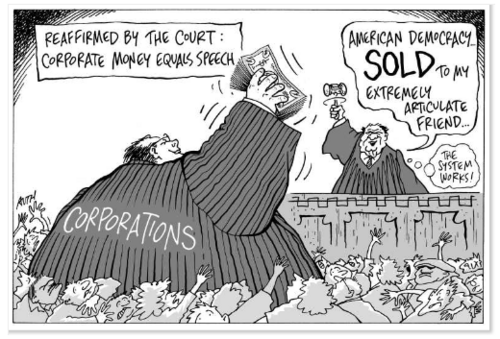The Rigged Financial System: How the ‘Common Man’ is Being Left Behind

The financial system, often seen as the bedrock of our global economies, paints a picture of fairness and impartiality. It's the engine that allocates resources and propels economic growth. Yet, the more we delve into the inner workings of this vast mechanism, the more it becomes apparent that it is not as equitable as it seems. The financial system is rigged as corporations, governments, and people in power have trillions of dollars of debt they can't possibly pay back, leading to inflation and regulation that negatively affects us all.
The huge gap in the standard of living paints a concerning picture, further supporting the fact that this system is rigged to benefit a privileged few while leaving the majority to bear the brunt. In this article, we will embark on a journey through the dilemma of systemic flaws and inequities deeply ingrained in the financial system. The goal is to shine a light on the mechanisms that perpetuate this rigging and unveil its far-reaching consequences on society.
The rigged financial system is like a well-kept secret that everyone knows about. As we explore this complex issue, we aim to provide a clearer understanding of how these mechanisms work without drowning you in jargon. It's a story that affects us all, and it's time we uncover the layers of complexity and injustice that have remained in the shadows. Let's dig deeper into how this rigged financial system is leaving the common person way, way behind.

Image source: Mohawk Nation News
The Rise of Inequality
Do you ever feel like you're having a hard time keeping up with the cost of living? Well, it's not just you; the financial system is rigged, but not in the way you might think. In short, corporations, governments, and the people in power have trillions, possibly quadrillions of dollars of debt that they can't possibly pay back. They can either default and lose everything or devalue this debt through inflation and keep it under control through regulation, and to our collective detriment, they've chosen the second option.
The financial system is rigged due to debt, inflation, and manipulation by corporations and governments. Still, individuals can navigate and improve their financial situation by understanding the system and making strategic investments. The disconnect between money and currency has led to inflation and devaluation, causing financial problems for the average person who is paid in a losing currency and trying to buy valuable things. At the same time, the government manipulates the cost of borrowing money.
Opportunity is supposed to be part and parcel of everyone’s dream, right? Well, unfortunately, reality says otherwise. Buckle up because we're about to take a roller-coaster ride through the awful numbers and depressing facts. You know those heartwarming stories you occasionally hear about a poor person who made it big? Yeah, those are like finding a unicorn in a sea of whales. They're that rare. The truth is that things are getting worse on the inequality front, and not just because of uncontrollable forces like technology and globalization.
No, the most disturbing part is that the ones making it worse are the ones who are supposed to be in charge. And the grand prize for rigging the system goes to the inherited plutocracy! The very people who have benefited from the rigged system are the same ones, making it even more rigged. For instance, in the United States, in the past 40 years, the income share of the top 0.1% has more than quadrupled, while the top 1% has enjoyed an almost doubled share. Meanwhile, the bottom 90% have seen their income share decline.
Wages at the bottom have remained stagnant for about 60 years (even with inflation taken into account). It's like time froze for the working class while the elite continued to live it up. And if you thought things couldn't get worse, think again. Those with a high school education or less have actually seen their incomes fall over the past few decades, especially the poor fellas. When inequality increases, hope decreases. People start losing faith in the system, and that's when things take a dark turn.

Image source: Wikipedia
Desperation leads to increased deaths from suicide, drug overdoses, and alcohol-related causes. Now you can see why we must discuss this rigged financial system. It's true; markets don't exist in a vacuum. Rules and regulations shape them. Surprise, surprise, those rules can be designed to favor one group over another.
Market manipulation is just one of the delightful practices in which the financial sector indulges. They get away with imposing outrageous interest rates on borrowers and creating securities set up to fail. And let's not forget their love for illegal activities like insider trading. They really know how to keep things spicy, don't they? But wait, there's more, rent extraction! This fancy term refers to the withdrawal of income from the national pie that is way more than these supposed "contributors" deserve. It's like a never-ending buffet for the elite. They get to feast on public resources like oil at ridiculously low prices while the rest of us struggle to make ends meet.
The Regulatory Capture
Regulatory capture is a troubling reality in the world of finance, and we can illustrate its impact through real-life examples. Imagine a scenario where a regulatory agency, let's call it the Financial Oversight Commission (FOC), is responsible for overseeing the banking industry. The FOC is supposed to ensure that banks operate fairly and within the bounds of the law, protecting the interests of the public.
However, powerful banking lobbyists and executives have increasingly influenced the FOC over time. These individuals have deep pockets, employ well-connected influencers, and even hire former FOC employees, creating a revolving door between the regulatory agency and the very industry it's meant to regulate.
This regulatory capture results in the FOC crafting policies and regulations that favor the banks rather than safeguarding the public's interests. Let's look at a real example to understand this better: The financial crisis of 2008.
During the lead-up to the crisis, some banks engaged in risky lending practices and bundled those risky loans into complex financial products. These practices were a ticking time bomb for the financial system. One would expect a diligent regulatory agency to spot these issues and intervene before disaster strikes. However, the FOC and other regulatory bodies failed to act decisively.
Why? Because they had been influenced and captured by the very financial institutions engaging in these risky behaviors. High-powered lobbyists and industry insiders shaped regulations in ways that allowed these practices to continue unchecked. The result was a devastating financial crisis that affected millions of people worldwide, leading to job losses, foreclosures, and a massive economic downturn.
In the aftermath of the 2008 crisis, there were calls for reform and increased transparency in financial regulation. However, breaking free from the clutches of regulatory capture remains an ongoing challenge. Both policymakers and the public must be aware of these issues and work toward restoring trust and accountability in the financial regulatory system. The influence of unofficial financial regulations like ESG is increasing, surpassing official regulations, and it's coming from unaccountable international organizations. These crazy regulations make things more difficult for the ordinary person than they already are.

Image Source: American Icons Temple
Rewriting the Economic Game
Rewriting the economic game, where the rules constantly change, the common man is left scratching his head, wondering when it will ever be his turn to win. Well, my friends, I hate to break it to you, but the game has been rigged for quite some time now. And in the land of the free and the home of the brave, it's the rich who are winning big time with the market power of corporations.
These powerhouses have always had a leg up on the little guy and girl. While other developed countries have some regulations to level the playing field, American corporations have been given free rein to run wild. Just think about it. These mega-corporations have more influence over lives than we even realize. They control the products we buy, the services we use, and the jobs we desperately cling to. And with their untamed market power, they can squeeze every last drop of profit out of us while we're left wondering how the hell we got here.
Remember the good old days when a hard day's work meant a decent paycheck and a secure future? Yeah, those days are long gone. The shift to a service-sector economy has left workers high and dry while the fat cats continue to line their pockets. You see, with the rigged rules of the game, workers have lost their bargaining power. Wages have stagnated, benefits have vanished, and job security is a thing of the past. And while we're busy trying to make ends meet, the rich keep getting richer, laughing all the way to the bank.
Here's the real kicker: This is happening because the political system is rigged. Gerrymandering, voter suppression, and the influence of money have turned democracy into a puppet show, with the rich pulling all the strings. No matter how hard we fight for change, the system is designed to keep us down. The roar of corporate dollars has drowned out the voices of the common man. And while we're left to pick up the pieces, the elite few continue to thrive, building golden towers with people’s blood, sweat, and tears.
The rewriting of the economic game has left us fighting an uphill battle with no end in sight. But fear not, for together with the rise of entrepreneurs, we can reclaim what is rightfully ours. We can demand a fair and just society where the ordinary person is no longer left behind. But until that day comes, we must continue to shine a light on the corruption and inequality that plague the world's nations.
We must use our voices, votes, and collective power to dismantle the rigged system and build a future where everyone has a fair chance at success. The economic game may be rigged, but if history has taught us anything, it's that the common person can rise and change the rules. So, let's roll up our sleeves and get to work because a brighter future is within our reach. And together, we can make it a reality.
Considering all this, wealth is concentrated in the hands of a few, leaving the rest struggling to make ends meet. Wages at the bottom are stagnant, job losses are rising, and despair is becoming all too common. But it's not just the forces of nature that have led us to this dire situation. No, it's the laws and regulations put in place by those who hold power. The system is rigged in favor of the wealthy, with market manipulation, financial sector exploitation, and rent extraction all contributing to the growing divide.
Special favors and favorable regulations further exacerbate inequality and make it harder for the common man to get ahead. And let's not forget about the rewriting of the economic game. The market power of corporations has grown exponentially while the power of workers has dwindled. This is not an accident but a result of a rigged political system where gerrymandering, voter suppression, and the influence of money reign supreme. It's a vicious cycle where economic inequality leads to political inequality, and ‘we, the people,’ are left to suffer the consequences. It's time to fight for a fair and equitable society where everyone has a chance to thrive, not just the privileged few. Together, we can dismantle the rigged system and build a brighter future for all.


(1).gif)